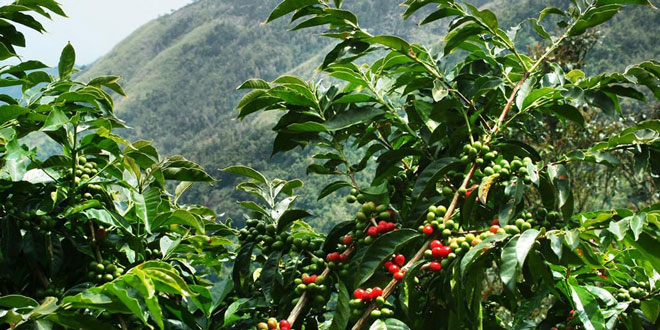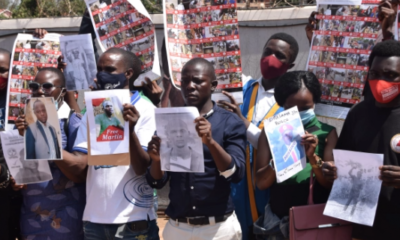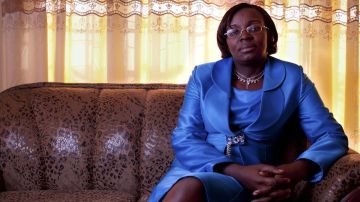
Ugandan Opposition Stands Firm Against Museveni’s Warnings Over Coffee Bill
In a charged prelude to tomorrow’s debate on the National Coffee Amendment Bill, 2024, Ugandan opposition legislators have doubled down on their support for coffee farmers, despite alleged threats of arrest by security forces.
The amendment seeks to dismantle the Uganda Coffee Development Authority (UCDA), which has overseen the sector for decades, sparking concern and resistance from members of the opposition caucus.
Addressing journalists at Parliament, Joel Ssenyonyi, Leader of the Opposition, decried what he described as a government ploy to infuse tribal and partisan tensions into the debate.
“No one is going to intimidate us, because no one wrote us an invitation and said, I would like you to come and sit in this House, no. Each of us here have been sent by the people who sent us, and those people are happy with the work that we are doing,” Ssenyonyi declared.
“So if anyone has got ideas to try and intimidate us, because we hear, they are planning to arrest some of us, we have been arrested so many times, that isn’t something you can use as a threat to some of us. So, we shall be here tomorrow, to defend economic empowerment.”
The opposition claims that the government, under President Yoweri Museveni, is not only undermining economic initiatives empowering coffee farmers but also twisting public discourse by attributing tribal motives to the issue.
Ssenyonyi underscored that coffee farming transcends tribal lines, benefiting communities across Uganda, not just those in Buganda.
“So all those who are trying to divide the people of Uganda to make it seem it is them against you, no, this is for all of us. If you look at some of the districts that produce a lot of coffee, a good number of them aren’t necessarily in Buganda,” he stated.
“So it is very problematic for anyone to try make this one a Buganda issue. This is an issue of Uganda because coffee is a cash crop that is benefitting many districts in Uganda. So why are you trying to make it like it is a Buganda issue? Let us stop dividing the people of Uganda.”
Showdown
However, President Museveni has not held back in his warnings to opposition leaders.
He accused them of misleading Ugandans and detracting from more vital national issues, particularly wealth creation.
“I’m really not happy with the people who divert our people’s attention. I’m tired of the misleaders of our people and they should check themselves or I will check them,” he said, underscoring his dissatisfaction with what he sees as deliberate misinformation about the government’s goals in the coffee sector.
On the rationalization of government programs, specifically the proposed abolition of the UCDA, Museveni rejected claims that the move would harm farmers.
He cautioned opposition legislators against politicizing the issue, issuing a direct threat. “We are going to have a showdown, they are liars and criminals playing with fire. They will not like the counterattack,” Museveni warned, adding that such actions would not go unanswered.
Yet Ssenyonyi countered these assertions by pointing to what he views as wasteful spending in other government areas.
“If the President is serious about cutting down on Government expenses, why does he always create new districts and new constituencies as we head for elections?” Ssenyonyi challenged.
“Why does he have a bloated Cabinet? Why are there so many Presidential Advisors? Why do we have so many RDCs, Deputy RDCs and now Assistant Deputy RDCs? That isn’t true, that is a lie, stop fooling the people of Uganda. I want to challenge the President, stop preaching water and then you drink wine.”
The heated debate comes at a critical moment, with coffee, Uganda’s primary export, standing as a vital source of income for many Ugandans.
Uganda is Africa’s largest coffee exporter and the world’s seventh-largest coffee producer. Coffee is a crucial export for Uganda, making up about 20–30% of its total export earnings.
As of recent years, coffee exports have generated around $500 million to $600 million annually.
In 2022, Uganda exported approximately 6.26 million 60-kg bags of coffee, earning about $862 million, according to reports from the Uganda Coffee Development Authority (UCDA).
These earnings fluctuate based on factors like global coffee prices, weather conditions, and crop yield, as well as Uganda’s ongoing efforts to increase production by expanding coffee-growing areas and promoting the Robusta and Arabica varieties.
Debate
The opposition has framed the UCDA abolition as a broader attempt by the government to stifle economic independence, fearing that a weakened coffee sector would lead to greater economic dependency on the government.
Ssenyonyi emphasized this point, saying, “So Government has made it, as if their policy [is] that Ugandans should not be empowered economically because they will be complicated, they will speak out for themselves and that is why they are fighting coffee now, because coffee has empowered Ugandans. They are making a good living out of it and now, they want to go after it, that is their plan.”
While the government contends that the amendment will streamline coffee regulation, the opposition argues it threatens farmers’ livelihoods and removes crucial support structures.
Tomorrow’s parliamentary debate is expected to be tense, with opposition members resolute in their commitment to protect coffee farmers’ interests despite threats.
The outcome will shape Uganda’s coffee sector—and potentially its political landscape—for years to come.
Ugandan Opposition Stands Firm Against Museveni’s Warnings Over Coffee Bill
News
Ugandan Citizen Abducted, Held in Secret Detention for Three Months, Sparks Outrage and Calls for Justice

A disturbing new case of unlawful detention has surfaced, highlighting the ongoing human rights crisis in Uganda. A Ugandan citizen was reportedly abducted and held in a secret facility, known as a “safe house,” for three months, only to be released without charge or explanation. This incident, reported by NTV Uganda, has sparked widespread condemnation and renewed calls for accountability regarding human rights abuses in the country.
While the details surrounding the abduction remain unclear, reports indicate that the individual was taken without due process and held incommunicado—an action that has long been condemned by human rights organizations. The victim’s release, with no charges filed and no clear justification, has angered activists and citizens, who view this as yet another case of egregious abuse of power by the state.
“This is a recurring pattern,” said one human rights activist. “Abductions, secret detentions, and unexplained releases have become all too common in Uganda. These acts violate fundamental human rights and erode public trust in the justice system.”
The use of “safe houses,” unregistered detention facilities reportedly operated by security forces, has been a focal point in numerous allegations of torture and illegal imprisonment. Despite repeated calls from both local and international organizations for their closure and accountability for those involved, little action has been taken to address these violations.
This case underscores the urgent need for reform within Uganda’s security apparatus and greater accountability for human rights abuses. Observers hope that drawing attention to these injustices will spur concrete action to bring those responsible to justice and ensure the protection of basic human rights.
As frustration mounts, calls for both domestic and international pressure to hold the government accountable for such crimes grow louder. “One day, there must be accountability for all these crimes against our people,” stated one social media user, reflecting the sentiments of many Ugandans.
News
NUP Gathering Disrupted: Kyagulanyi Alleges Security Force Harassment and Arrests

National Unity Platform (NUP) President Robert Kyagulanyi has accused Ugandan security forces of using excessive force to disrupt a planned NUP gathering. The allegations were detailed in a statement shared on Twitter, following an event held to honor children of NUP supporters who were killed, disappeared, or detained for their political beliefs.
According to Kyagulanyi, security personnel, under the command of an officer identified as Asiimwe, carried out a preemptive operation early in the morning upon learning of the NUP’s plans. The forces allegedly stormed the premises, arrested workers, and deployed tear gas to disperse those present.
“The criminals under the command of one Asiimwe deployed early morning, arrested our workers, and threw tear gas into our premises. They’ve cordoned off the premises and blocked all people from accessing the place,” Kyagulanyi wrote.
Among those reportedly arrested were Saava Peter, Mudenya Samson, and Turyasingura Samson. Kyagulanyi claimed the detained workers were subjected to beatings and interrogated about their political affiliations, with security operatives labeling them as terrorists.
“These JATT operatives asked the workers who they support politically, branding them terrorists and criminals—their only crime being that they work with us. You can imagine the indignity!” Kyagulanyi lamented.
This incident adds to the growing tension in Uganda’s political climate, where opposition parties frequently accuse the government of stifling dissent. Despite the challenges, Kyagulanyi ended his statement with a message of defiance and optimism, proclaiming, “UGANDA WILL BE FREE.”
NUP Gathering Disrupted: Kyagulanyi Alleges Security Force Harassment and Arrests
News
Sudan Demands Apology from Uganda Over Army Chief Muhoozi Kainerugaba’s Threat to Invade Khartoum

Sudan has demanded an official apology from Uganda over “offensive and dangerous” comments made by the chief of Uganda army staff, who threated to invade Khartoum, the Sudan Tribune has reported.
General Muhoozi Kainerugaba, son of Ugandan President Yoweri Museveni and CDF of the Ugandan army, posted two comments on the X platform on Tuesday in which he threatened “to capture Khartoum” with the support of the US President elect Donald Trump after he takes office. The posts were deleted later.
“The government of Sudan demands and official apology from the Ugandan government for the offensive and dangerous comments of the army commander,” Sudan’s foreign ministry said in a statement that the Sudan Tribune said it has seen.
Sudan Demands Apology from Uganda Over Army Chief Muhoozi Kainerugaba’s Threat to Invade Khartoum









